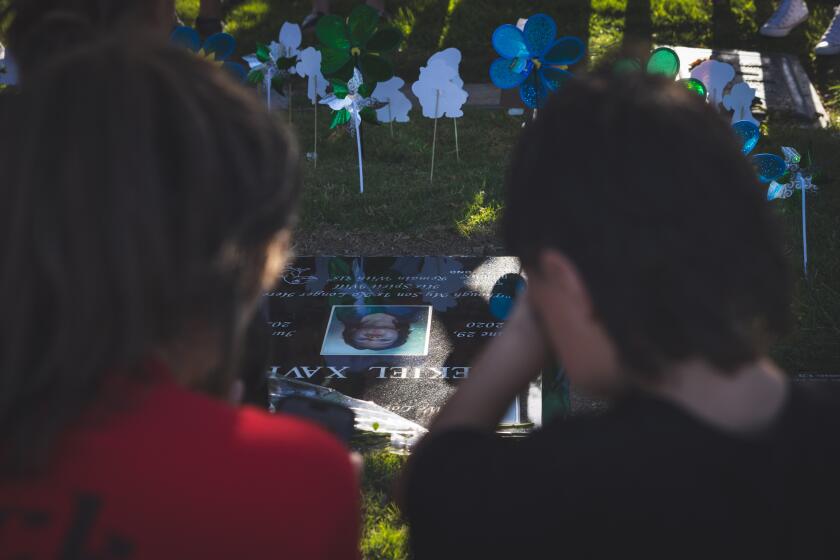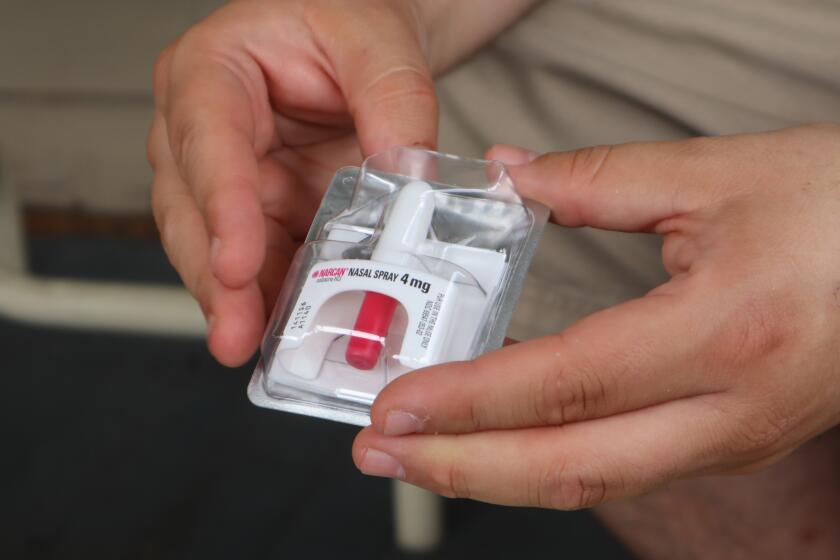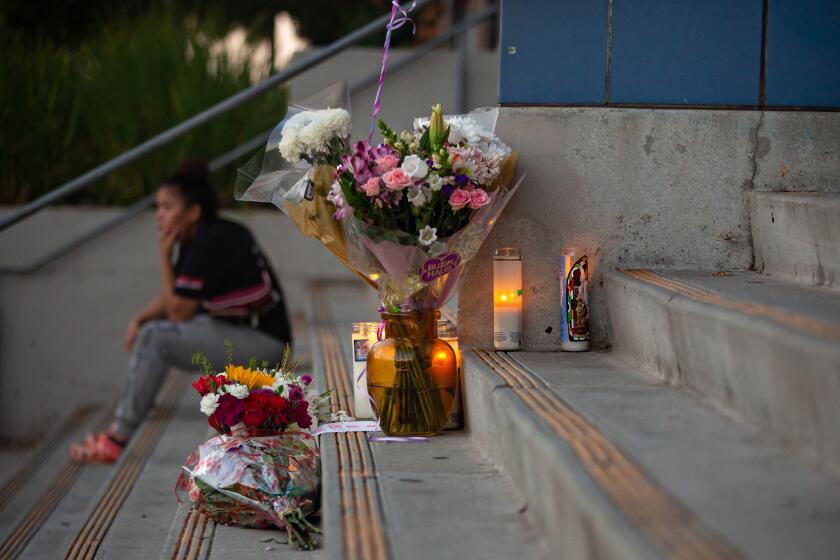
- Share via
The first time Harold Noriega voted for Donald Trump in 2016, it was from a business standpoint.
But when he cast his ballot again in 2024 — two years after his 19-year-old son, Cooper Noriega, took a fentanyl-laced pill and died — his primary motivation had changed.
“I truly believe this in my heart, that if the president of our country in the previous four years would have secured the border,” Noriega said, “our son probably would be alive.”
The bill passed the Senate, 84 to 16, with all the no votes from Democrats. It next heads to the House, where a similar version has passed with significant Democratic support.
President Trump has pledged in his second term to tighten national security, beginning with an immigration crackdown that launched within hours of his January inauguration. Since then, he’s rebranded cartels as foreign terrorist groups and used tariffs as leverage to push Mexico to block the flow of illicit drugs into the U.S.
“We’ve launched an all-out war on fentanyl traffickers, and it’s a war that we’re going to win,” Trump said in a March 14 address to the Justice Department. The presidential administration is also pushing for fentanyl trafficking to be designated as a “weapon of mass destruction,” unleashing more federal resources and stricter enforcement, according to the Department of Defense.
Trump’s tactics are encouraging to many parents of drug victims, including Noriega, who noted that even though signs point toward overdoses being on the decline, fentanyl is still killing about 70,000 Americans annually.

“If Trump doesn’t do what he says he’s going to do, I’ll be the first person to be shouting, ‘I was wrong. I was wrong about that — that guy’s a fraud,’” Noriega said. “But so far, it doesn’t seem to be that way.”
California officials for several years have similarly doubled down on supply-side interventions such as specialized task forces and aggressive prosecution to fight the opioid crisis.
‘Oopsie…Too late,’ wrote Salvadoran President Nayib Bukele, a Trump ally who agreed to house about 300 migrants in his country’s prisons.
Los Angeles County Dist. Atty. Nathan Hochman and California Atty. Gen. Rob Bonta this month announced a 50-pound fentanyl seizure in Downey that Bonta called the “biggest bust yet” from a new state effort.
“We’re hoping that the message goes out from this enforcement effort today to the fentanyl poisoners out there, that we’re coming for you,” Hochman said.
The term “fentanyl poisoning” is one that parents of fentanyl victims have advocated should replace “overdose” in the discourse around drug fatalities — contending that the latter term unfairly assigns blame to victims and is inaccurate given that many ingest the drug unknowingly.
It’s just one of the ways they’ve continued to influence the conversation around the opioid epidemic. But their impact has also gone far beyond semantics.

In Riverside County, Temecula resident Matt Capelouto completely changed local management of drug cases when he challenged the ruling of his daughter Alexandra Capelouto’s 2019 fentanyl death as “non-criminal.”
Alexandra, a 20-year-old college student, died after taking a fentanyl-laced pill she believed to be prescription medication.
Frustrated by the county’s refusal to treat his daughter’s death as a crime, Capelouto resolved to hold her dealer accountable. The case eventually made its way to Riverside County Dist. Atty. Mike Hestrin.
The dealer who sold Jax Markley a fatal fentanyl pill will serve six years — a conviction made possible by a new effort to investigate overdoses as murders, not accidents.
“He asked me a question, ‘Why isn’t it murder?’” Hestrin said, recalling an early meeting with Capelouto.
The district attorney said his inability to provide an answer was “the pulling of the proverbial thread,” which eventually led the county to overhaul its treatment of overdose cases.
To date, Hestrin said, he has charged 38 suspected fentanyl dealers with murder, three cases have gone to trial, and 16 suspects have pleaded guilty to a lesser offense. In 2023, his office became the first in California to secure a guilty verdict by jury in a fentanyl-related homicide trial.

Critics of Hestrin’s hard-line approach contend that pursuing murder charges against dealers does nothing to reduce demand for drugs and tends to give the stiffest punishments to people at the lowest rungs of the supply chain. Plus, new dealers will always crop up.
But Capelouto said people hardly think this way about other crimes.
“We wouldn’t say, ‘Well, you know, why bother arresting a bank robber? There’s just going to be more bank robbers,’” Capelouto said.
Capelouto added that just weeks after his daughter’s dealer found out she was dead, evidence showed he was requesting more pills from his supplier.
“You cannot tell me that locking him up has not saved lives,” he said of the dealer, who was sentenced to nine years in prison in 2023.
A second-degree murder jury verdict for knowingly supplying fentanyl, a first for California, marks the next step in Riverside County’s war on drugs.
The Riverside County district attorney also stood by his approach.
“I’m not naive. I don’t think that we are going to stop the drug trade because we’re prosecuting it,” Hestrin said.
Nevertheless, he said, “we still have to keep the pressure on these drug trafficking organizations and on these drug dealers, even though we know that we’re not likely to see the end of fentanyl or the drug trade anytime soon.”
In Bakersfield, a 2-year-old died from acute fentanyl toxicity, and his father has been charged with murder. In California, there were 11 fentanyl-related deaths for children younger than 5 in 2023, according to preliminary data.
Los Angeles authorities have also pursued several homicide cases against suppliers in drug deaths, though not all of the defendants are dealers in the conventional sense. The mother and grandfather of a 17-month-old boy who died after being exposed to fentanyl face murder charges, brought by county prosecutors with support from the child’s father.
The rise in aggressive prosecution tactics has made Kyara Mascolo, whose 37-year-old son, Ray Mascolo, died in 2020 after taking a fentanyl-laced pill, the most optimistic she’s been since she lost him.

In early March, Ray’s dealer was convicted of eight drug charges including distributing fentanyl that caused three near-fatal overdoses. After the guilty verdict in Los Angeles federal court, Kyara Mascolo released a statement thanking the federal prosecutors and gave a shout-out to Trump for designating drug cartels as “terrorist organizations.”
“It’s a huge problem that hasn’t gone away, and it’s finally being dealt with,” Mascolo said in an interview with The Times. “So at least it’s, I hope, the beginning of the end.”

But experts in harm reduction, a public health approach that focuses on promoting safe drug use practices rather than enforcing abstinence, warned that hyperaggressive prosecution is little more than political performance, designed to pacify constituents and distract them from the underlying causes of the drug epidemic without actually solving the problem.
“The parent paradigm of pushing for tougher sentencing and tougher approaches in many ways reflects this theater that prosecutors and lawmakers are engaged in,” said Leo Beletsky, a drug policy researcher at Northeastern University and UC San Diego. “This is the narrative that they have been telling the public for a long time.”
Beletsky pointed to years of research indicating that prosecutions do not effectively deter drug use or distribution, and that harm reduction services — Medicaid expansion, increased access to Narcan and affordable substance abuse treatment — are the true cause of declining drug fatalities.
Workplaces in California could eventually be required to stock first aid kits with naloxone or another opioid overdose reversal medication under the bill signed by Newsom.
Many parent-led advocacy groups push for these approaches, Beletsky said, but their voices are typically ignored because they don’t suit politicians’ agendas — or they’re drowned out by the often louder cries of parents demanding justice.
“Even if those other parents wanted to be loud, there’s just not a microphone,” said Lindsay LaSalle, managing director of policy at the Drug Policy Alliance, a New York-based nonprofit that aims to decriminalize drug use and supports harm reduction.
“People aren’t interested in profiling [parents] that are like, ‘My child died, and I think we need good healthcare!’” LaSalle said.
But the perceived indifference hasn’t deterred Susan Ousterman, whose 24-year-old son, Tyler Cordeiro, died in 2020 from an overdose of fentanyl, heroin and xylazine, a veterinary tranquilizer increasingly common in illicit drugs.
Ousterman has long advocated for the replacement of punitive measures that perpetuate stigma around drug use with healthcare and treatment interventions that promote recovery for addicts.
“We’re not going to get the resources that people need to them as long as they’re viewed as criminals,” Ousterman said. “These are just people trying to find relief in some way.”
The Netflix miniseries dramatizes the story of OxyContin’s rise, but the beginning frames of each episode start with a disclaimer read by the families of real victims of the opioid crisis.
Ousterman said she reached out to the person her son took drugs with on the day he died. That person was so terrified of being prosecuted, Ousterman said, he took nine months to respond.
The two of them eventually became very close. He was a very bright kid, Ousterman said, who’d lost both his parents at a young age.
“What would that have done if I had sent him to jail, and then, 40% more chance of him dying?” she said, citing statistics that show recently incarcerated people have an elevated risk of overdose. “If his mother was alive, I wouldn’t want to meet her in a grief support group.”
The difficulty with harm reduction interventions is that they can take time to yield tangible results, said Jaime Arredondo, a substance use researcher who works on overdose prevention at the U.S.-Mexico border.
Politicians don’t want to wait, Arredondo said. They want a “magic bullet.”
Some parents of fentanyl victims agree with that perspective.

Amy Neville, whose 14-year-old son, Alexander, died in 2020 after taking a fentanyl-laced pill he bought on Snapchat, is among those skeptical of the rhetoric around shutting down the border and throwing away the keys when locking up dealers.
“Even if we closed everything up and drugs couldn’t get in or out tomorrow,” Neville said, homegrown operations would pop up to meet user demand.
The yoga instructor-turned-activist instead favors a public health approach to the opioid crisis that is grounded in educating young people about drugs in the digital era — and pressing tech companies to create better safeguards for young users.
Neville is the lead plaintiff in one of several lawsuits filed on behalf of more than 60 families of fentanyl victims — including the Capeloutos — against Snap, Snapchat’s parent company. The families argue the social media giant’s “defective and dangerous” product facilitated deadly drug sales.
Fentanyl deaths among teens more than doubled from 2019 to 2020, increasing from 253 to 680. Last year, the number jumped to 884, according to a report from the Journal of the American Medical Assn.
Snap has said it has no duty to “protect users from the acts of third-party criminals,” court documents said. The case remains pending in Los Angeles County Superior Court.
Apart from the litigation, Neville said, she’s committed to fighting the stigma around substance abuse disorder. Even hard-liners such as Noriega agree that is part of a long-term solution.
Recycling tactics from a failed war on drugs will only make that stigma worse, Neville said.
“We have to come up with better plans,” she said.



















